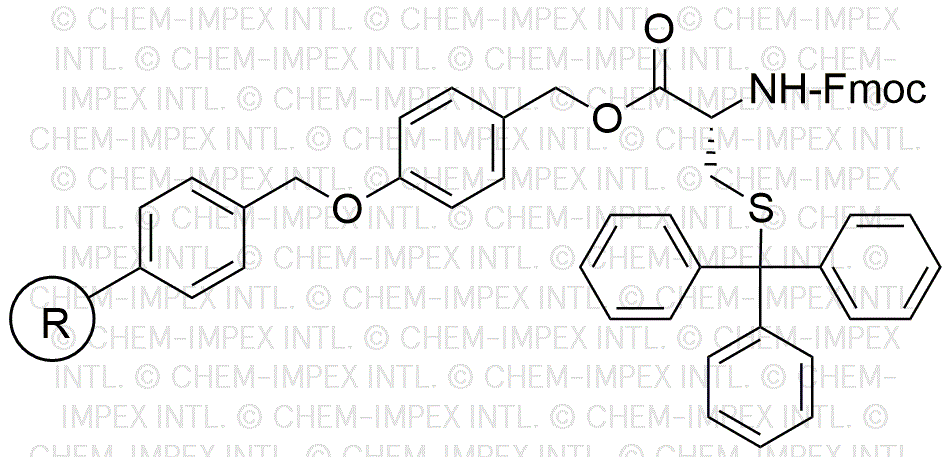Fmoc-S-trityl-D-cysteine 4-alkoxybenzyl alcohol resin is widely utilized in research focused on:
- Peptide Synthesis: This resin is essential for solid-phase peptide synthesis, allowing researchers to create complex peptides efficiently and with high purity.
- Drug Development: Its application in the synthesis of peptide-based drugs helps in the development of targeted therapies, particularly in oncology and infectious diseases.
- Bioconjugation: The resin facilitates the attachment of peptides to various biomolecules, enhancing the efficacy of therapeutics and diagnostics in biomedical research.
- Protein Engineering: By using this resin, scientists can modify proteins to improve their stability and functionality, which is crucial for biopharmaceutical applications.
- Research in Chemical Biology: It serves as a valuable tool for studying protein interactions and functions, aiding in the understanding of cellular processes and disease mechanisms.
General Information
Properties
Safety and Regulations
Applications
Fmoc-S-trityl-D-cysteine 4-alkoxybenzyl alcohol resin is widely utilized in research focused on:
- Peptide Synthesis: This resin is essential for solid-phase peptide synthesis, allowing researchers to create complex peptides efficiently and with high purity.
- Drug Development: Its application in the synthesis of peptide-based drugs helps in the development of targeted therapies, particularly in oncology and infectious diseases.
- Bioconjugation: The resin facilitates the attachment of peptides to various biomolecules, enhancing the efficacy of therapeutics and diagnostics in biomedical research.
- Protein Engineering: By using this resin, scientists can modify proteins to improve their stability and functionality, which is crucial for biopharmaceutical applications.
- Research in Chemical Biology: It serves as a valuable tool for studying protein interactions and functions, aiding in the understanding of cellular processes and disease mechanisms.
Documents
Safety Data Sheets (SDS)
The SDS provides comprehensive safety information on handling, storage, and disposal of the product.
Product Specification (PS)
The PS provides a comprehensive breakdown of the product’s properties, including chemical composition, physical state, purity, and storage requirements. It also details acceptable quality ranges and the product's intended applications.
Certificates of Analysis (COA)
Search for Certificates of Analysis (COA) by entering the products Lot Number. Lot and Batch Numbers can be found on a product’s label following the words ‘Lot’ or ‘Batch’.
*Catalog Number
*Lot Number
Certificates Of Origin (COO)
This COO confirms the country where the product was manufactured, and also details the materials and components used in it and whether it is derived from natural, synthetic, or other specific sources. This certificate may be required for customs, trade, and regulatory compliance.
*Catalog Number
*Lot Number
Safety Data Sheets (SDS)
The SDS provides comprehensive safety information on handling, storage, and disposal of the product.
DownloadProduct Specification (PS)
The PS provides a comprehensive breakdown of the product’s properties, including chemical composition, physical state, purity, and storage requirements. It also details acceptable quality ranges and the product's intended applications.
DownloadCertificates of Analysis (COA)
Search for Certificates of Analysis (COA) by entering the products Lot Number. Lot and Batch Numbers can be found on a product’s label following the words ‘Lot’ or ‘Batch’.
*Catalog Number
*Lot Number
Certificates Of Origin (COO)
This COO confirms the country where the product was manufactured, and also details the materials and components used in it and whether it is derived from natural, synthetic, or other specific sources. This certificate may be required for customs, trade, and regulatory compliance.


